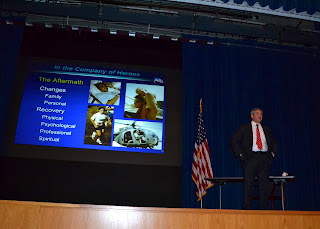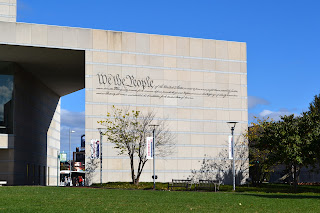As we enter our last week at the National Academy, it is bitter sweet. We look forward to seeing our families and friends back home and returning to our "normal" lives, while simultaneously feeling disappointment that we will not be seeing our new friends and "family" and will be returning to our "normal" lives. I will admit that it has been a pleasant experience only being responsible for myself, sleeping through the night (no late night calls), and having my day (to include workouts) planned and precisely scheduled for me. Over these past two months, I have been fortunate enough to see and do a a vast and varied array of things that many people will not see and do over a lifetime. I have been to museums, monuments, battlefields, and a ballpark. I have met pilots, POWs, and even a general. I have learned in the classroom from the best the field has to offer. Chief among my experiences, though, is that I have been provided a very unique opportunity to not just meet but really get to know law enforcement leaders from around the world. Through academic projects, physical fitness challenges, and extracurricular activities, we have formed strong bonds. These bonds are only seeds though. If they are watered and provided sun and nutrients, they will sprout, grow complex root systems, and continue to grow into something much bigger and stronger - something from which new life can be generated. If they are neglected, they will simply wither and dry up into a shell of what they were.
We have one benefit that some of our predecessors did not. Technology like cell phones and email and social media like Facebook, Twitter, and LinkedIn are already being used to communicate amongst our group, and they will continue to help us keep in touch. What has brought us together, though, is not an internet "friendship" where we "like" each others photos. The fact that we have succeeded, and sometimes suffered, as a group is what has drawn us together. We will need to maintain those human connections if we wish to maintain the camaraderie that we have enjoyed thus far. As we go on to succeed as individuals in our personal and professional lives, we will need to celebrate with one another. As we go on to face challenges as individuals in our personal and professional lives, we will need to support and assist one another - just as we have grown accustomed to here. We each have a new network of associates that gives us nearly unlimited "phone a friend" opportunities. A new problem we may face is likely an old problem for one of our fellow classmates. This benefit is really only a benefit if it used and used regularly.
This week has been eventful. I would be remiss if I did not mention the fact that we completed our series of physical challenges. Continuing along with the Wizard of Oz theme, we completed the finale this week, the "Yellow Brick Road." The National Academy describes it as "a 6.1-mile grueling run through a hilly, wooded trail built by the Marines. Along the way, the participants must climb over walls, run through creeks, jump through simulated windows, scale rock faces with ropes, crawl under barbed wire in muddy water, maneuver across a cargo net, and more." Upon successful completion of this challenge, you are awarded an actual yellow brick. While arguably the most difficult, it was absolutely the most enjoyable physical challenge we have faced and will be one of the most memorable experiences from my time here. I had great company along the trail (thanks to Joe, Kirk, and Dave) and despite the distance and terrain, we had a lot of fun completing the obstacles and finishing together as a team. While some of my classmates are marathon runners (literally), I am not what you would call an enthusiastic runner. I run because my profession demands it of me. So, though I have run longer distances (years ago), I would consider the Yellow Brick Road to be one of the more significant physical fitness events I have faced and will thus be proudly displaying my brick once I return home. Several of us carried cameras along the way. I also wore a body camera to document the event. I have provided a peek below.
I, like many of my classmates, have been all too aware that this was our last weekend and have tried to squeeze everything I can out of it. This weekend, I was able to eat dinner with a friend from the Royal Canadian Mounted Police. He and I hit it off early in our session and while we have spent quite a bit of quality time together running, doing pushups and burpees, and flipping tires, we have also had the opportunity to tour some monuments and museums together. On Friday, though, we enjoyed a great dinner at a Quantico landmark called the Globe and Laurel and were able to discuss everything from family to the future of our respective agencies. While the food was superb, it was actually upstaged by the atmosphere. The owner of the restaurant is a retired Marine who has one of the most superb personal collections of law enforcement memorabilia that I have ever seen. The ceiling is quite literally covered in over 7,000 police patches from every agency imaginable. The walls are decorated with badges, uniform hats, firearms, and photos representing local, state, federal, and international law enforcement agencies. Any time you can combine great atmosphere with great food and great conversation, it is a good night.
We have one benefit that some of our predecessors did not. Technology like cell phones and email and social media like Facebook, Twitter, and LinkedIn are already being used to communicate amongst our group, and they will continue to help us keep in touch. What has brought us together, though, is not an internet "friendship" where we "like" each others photos. The fact that we have succeeded, and sometimes suffered, as a group is what has drawn us together. We will need to maintain those human connections if we wish to maintain the camaraderie that we have enjoyed thus far. As we go on to succeed as individuals in our personal and professional lives, we will need to celebrate with one another. As we go on to face challenges as individuals in our personal and professional lives, we will need to support and assist one another - just as we have grown accustomed to here. We each have a new network of associates that gives us nearly unlimited "phone a friend" opportunities. A new problem we may face is likely an old problem for one of our fellow classmates. This benefit is really only a benefit if it used and used regularly.
This week has been eventful. I would be remiss if I did not mention the fact that we completed our series of physical challenges. Continuing along with the Wizard of Oz theme, we completed the finale this week, the "Yellow Brick Road." The National Academy describes it as "a 6.1-mile grueling run through a hilly, wooded trail built by the Marines. Along the way, the participants must climb over walls, run through creeks, jump through simulated windows, scale rock faces with ropes, crawl under barbed wire in muddy water, maneuver across a cargo net, and more." Upon successful completion of this challenge, you are awarded an actual yellow brick. While arguably the most difficult, it was absolutely the most enjoyable physical challenge we have faced and will be one of the most memorable experiences from my time here. I had great company along the trail (thanks to Joe, Kirk, and Dave) and despite the distance and terrain, we had a lot of fun completing the obstacles and finishing together as a team. While some of my classmates are marathon runners (literally), I am not what you would call an enthusiastic runner. I run because my profession demands it of me. So, though I have run longer distances (years ago), I would consider the Yellow Brick Road to be one of the more significant physical fitness events I have faced and will thus be proudly displaying my brick once I return home. Several of us carried cameras along the way. I also wore a body camera to document the event. I have provided a peek below.
Joe and I stopped for a photo op as we "raced" to the top
Under the barbed wire
Yellow bricks look suspiciously similar to common pieces of gravel
I, like many of my classmates, have been all too aware that this was our last weekend and have tried to squeeze everything I can out of it. This weekend, I was able to eat dinner with a friend from the Royal Canadian Mounted Police. He and I hit it off early in our session and while we have spent quite a bit of quality time together running, doing pushups and burpees, and flipping tires, we have also had the opportunity to tour some monuments and museums together. On Friday, though, we enjoyed a great dinner at a Quantico landmark called the Globe and Laurel and were able to discuss everything from family to the future of our respective agencies. While the food was superb, it was actually upstaged by the atmosphere. The owner of the restaurant is a retired Marine who has one of the most superb personal collections of law enforcement memorabilia that I have ever seen. The ceiling is quite literally covered in over 7,000 police patches from every agency imaginable. The walls are decorated with badges, uniform hats, firearms, and photos representing local, state, federal, and international law enforcement agencies. Any time you can combine great atmosphere with great food and great conversation, it is a good night.
In front of the FBI tribute wall
The Globe and Laurel
A panoramic view showing a fraction of the patches
One item on my NA bucket list that had not been checked off was a trip to Gettysburg. That item was checked off this weekend. Several of my classmates and I made the short trip to Gettysburg Saturday. It was one of the best days I have had here. We visited the museum, watched a film that provided a good knowledge base of the battle, and saw the cyclorama which is a 360˚ multi-sensory painting. We then were able to, not only tour the battlefields, but do so from horseback. It was a great way to view the battlefields. Our guide was very knowledgable adding details to supplement what we had learned in the museum. Actually seeing the terrain and landmarks from the perspective of those involved brought lessons from a history book to life. The evening ended with dinner in a colonial era tavern in the basement of the historic Dobbins House. Again, we found a winning combination of great food, atmosphere, and conversation.
No photo of the cyclorama will do it justice, but here is one anyway
A fence that uses no post holes, nails, or screws, the National Park Service uses documents such as post-battle insurance claims to maintain things in a historically accurate way
A view from the high ground
Me and Viggo
Over the next two days we will attend our last classes and take our final exams here at the NA. Our families and bosses will arrive to celebrate our graduation, and we will part, going our separate ways. Seeds have been planted. It will be up to each of us to water those seeds to ensure that the relationships formed here will continue on for years to come. My next post will be as a proud graduate of the 251st Session of the FBI National Academy. Until next time...





















































